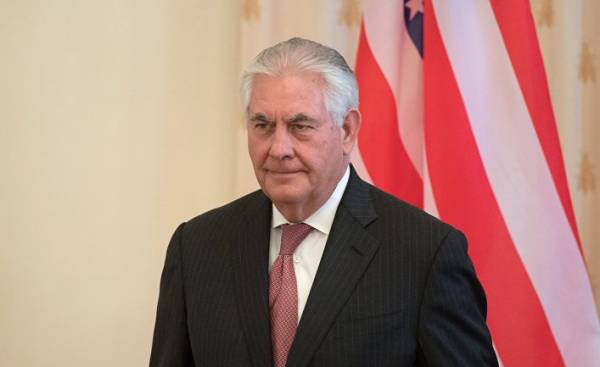
Secretary Rex Tillerson has done the unthinkable sin in the eyes of many experts on foreign policy, saying two weeks ago at a meeting in the Italian Lucca: “Why should the American taxpayer be interested in Ukraine?”
Ann Appelbaum (Anne Applebaum) of The Washington Post responded sharply: “No, Rex Tillerson, the American taxpayer should not be all the same.” Then she added, referring to past corporate Tillerson:
It is impossible to prove neither the calculations nor the books. There is nothing that can draw corporate leadership and shareholders. All that we “invested” in Ukraine, will not bring profit in the near future. To see the value of a strong Pro-Western Ukraine, it is necessary to understand the value of the Alliance, who’s 70 years old.
The President of the Council on foreign relations (Council on Foreign Relations) Richard Haass (Richard Haass) said that if you leave Ukraine at the mercy of Vladimir Putin, all the new States want to become the possessors of nuclear weapons. After the collapse of the Soviet Union, Ukraine in 1994 convinced to sign the Budapest Memorandum, renouncing its nuclear weapons in exchange for security guarantees, which it received from Russia and the United States.
Putin pointedly refused this obligation, capturing the Crimea and continuing meddling in Eastern Ukraine. If in the face of such aggression the Americans are indifferent to Ukraine, writes Haas, it would have a “horrible signal to other leaders that nuclear weapons can pose a threat to their political well-being and territorial integrity.”
Such a reaction to a careless remark Tillerson (one of his assistants called it a “rhetorical technique”) is a reflection of deep-rooted ideas about the importance of Treaty obligations of the United States, as well as a firm belief in imaginary America’s commitment to international norms. For those people who led American foreign policy the last few decades, is the essence of what makes America exceptional. Madeleine Albright said on this occasion: “We are America. We are the indispensable nation. We don’t drop dignity. We look further into the future.” And recently Hillary Clinton said about the “certain obligations”, say, to the allies, which should “be absorbed into the DNA of American foreign policy.”
But American leaders stand on shaky ground when you start to preach to others about the importance of compliance with international agreements and the territorial integrity of sovereign States. It even recognizes Richard Haas. “The fact of the invasion of Iraq and Libya after their denuclearization and that a nuclear North Korea will not attack, this is a lesson learned by all,” he writes.
Meanwhile, many Americans do care when their government kill innocent people or throw them in jail on dubious charges. They argue that when countries invading their neighbors. On the other hand, American leaders often close my eyes and urge to do the same community when such atrocities do their allies (e.g., Egypt, Turkey, Saudi Arabia). Such a reaction obviously refutes the claim that Americans are not indifferent to certain fundamental principles, especially when such indifference is evident.
The most important question is not why American taxpayers should be interested in Ukraine. Rather, it should be: “To what extent Americans should be interested in Ukraine?” Or this: “The willing to risk and how much are willing to spend the Americans for the approval of the Ukrainian territorial integrity?”
And here we can see large discrepancies between the foreign elite and the society. Trump is shamelessly exploited these differences during his campaign and in the first days of his presidency, putting forward the slogan “America first”.
A few years ago was conducted a sociological poll among Americans. They asked if they are willing to fight Russia to protect Poland, Turkey and Latvia. “Yes,” said the 40, 29 and 21%, respectively. To protect Britain volunteered 56% of respondents. All these countries are formal allies of the US Treaty. And Ukraine is not. In the same survey it became clear that war with Russia over Ukraine are 22% of respondents.
The accuracy of these surveys can be questioned. Because so many gave the answer “not sure”, it is reasonable to assume that sentiment will change if the President will strongly urge the us to launch military action. However, it is impossible to ignore the fact that the protection of the safety of others is not for most Americans the essence of what makes America exceptional. A survey conducted recently by the research organization Chicago Council on Global Affairs showed that the protection of the security of others has occupied the last place in the list of the 12 “very important foreign policy goals.”
Today, the biggest discrepancies can be seen between the elite and the voters of the Republican party. A survey conducted on the eve of the November election showed that 71% of the leaders of the Grand old party said “very important” to protect the security of our allies, but among rank and file Republicans such people is only 36%.
In General, Americans care about other countries, but to risk American lives for the sake of some of the principles they don’t want. It is not even clear whether Americans are ready to pay higher taxes and accept cuts in popular domestic programs, to manifest in this way care for the safety of others.
Such sentiments in society can rejoice. They can complain about. But you cannot ignore them. And the Secretary of state’s Rex Tillerson is not necessary to blame and praise for what he ventured to ask this extremely important question.
Christopher Preble Vice President Cato Institute (Cato Institute), headed by the program of studying of problems of defence and foreign policy. He is the author of “power Problem. How American military dominance makes us less secure, less prosperous and less free” (The Power Problem: How American Military Dominance Makes Us Less Safe, Less Prosperous, and Less Free).







